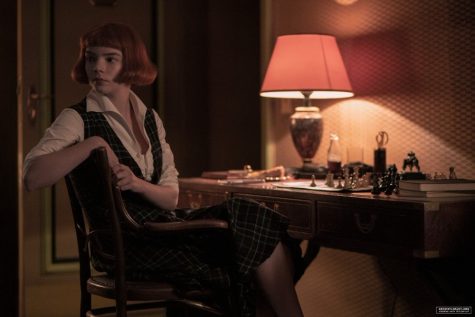Why television needs more characters like Beth Harmon of The Queen’s Gambit
The Beth Harmon character wins time and time again in a culture that roots for her downfall
March 11, 2021
“Alluring”, “an absolute win”, and “the most satisfying show on television”—what do these three phrases have in common? They’ve all been used by critics to describe Netflix’s recent sensation, The Queen’s Gambit. It’s no secret that this show, following the journey of orphan Beth Harmon as she rises to stardom in the world of chess and struggles with addiction and loneliness, was well-received. It is often praised for its aesthetically pleasing cinematography and for the stellar performance of lead actress Anya Taylor-Joy.
But a show cannot succeed on beauty of picture and performance alone; the writing must shine as well. So what is it that we love so much about the writing of The Queen’s Gambit? The opinion of many a viewer seems to be that the triumph of the show is the unique identity of protagonist Beth Harmon.

The character Beth of The Queen’s Gambit, originally created in Walter Tevis’ 1983 novel of the same name and adapted for television by Scott Frank, has been at the forefront of both the acclaim and the criticism of the show. Beth is often praised for the way that she “rarely wavers in her confidence,” (Rachel Syme for The New Yorker) or the manner in which she apparently “was built to not care or even take much notice of the judgmental looks she gets when she takes on a high school chess club made up entirely of young men,” (Mary McNamara, The Los Angeles Times). While a tale of being a woman in a male-dominated field seems to be a classic, even predictable feminist trope, The Queen’s Gambit presents it in such a way that Beth herself is as uncaring about her role in the overwhelmingly male chess competitions as if she was completely unaware of her situation altogether.
The show does not depict a young girl’s struggles against oppressive male power, it merely acknowledges that the oppressive structure exists and allows its main character to carry on with the confidence and ease of someone who is not oppressed at all. In other words: Beth is not successful despite being the only woman, she’s just successful.
However, not every member of the show’s audience seems to agree with this sentiment. If you venture to type “The Queen’s Gambit beauty debate” into your search bar, you’ll come across many a scathing review claiming that Anya Taylor-Joy is just too drop dead gorgeous to play a character who rises in the ranks of chess despite being surrounded by men—wouldn’t the men simply fall in love with the beautiful Beth Harmon, even want her to succeed, and play their games accordingly?
One critic even went so far as to say that “She’s a confident girl who finds everyone annoying and wears great clothes and flies off to beautiful places to be weird around guys. If she didn’t play chess and weren’t such a [censored], it would be Emily in Paris,” (Sarah Miller for The New Yorker). But this is simply untrue when one considers the motivations of the male characters that surround Beth. Men who devote their time to chess clubs, who pay fees of their hard-earned money to take part in countless chess tournaments, who are so talented that they find themselves playing against Beth for international titles in glamorous cities such as Paris and Moscow, would not throw away all of their progress just to win the favor of the doe-eyed female competitor that sits before them.

To say that Anya Taylor-Joy’s beauty undercuts the writing of Beth Harmon’s character is not only untrue, but portrays a fundamental misunderstanding of everything The Queen’s Gambit stands for. She wins again and again in a culture that thrives on her downfall, and does so without paying any sort of attention to the men who want her to fail. She wins not because she wants to garner attention by being the first female World Champion, but simply because she loves chess, and she has an immense talent for it. Becoming the first female World Champion is just an additional perk to something she would have done regardless of her gender.
In an industry where female characters are typically only seen as valid in their femininity if they are emotionally motivated, deeply caring to an even maternal extent, in constant pursuit of a relationship or other form of external validation, et cetera, Beth Harmon defies every last construct set for characters like herself. This is because Beth is written not as the classic, emotionally driven female character nor as the equally damaging trope of the woman who must overcome certain aspects of her femininity in order to succeed in a male-dominated world—instead, she is relatively unemotional on the surface, motivated by her own personal drive and hunger for success, yet also exceedingly feminine.
Beth Harmon is beloved by a massive female audience for her ability to keep her emotional life completely separated from her professional life. The typical representation in film of women with high-powered careers is either (a) the woman who rejects any stereotypically ‘feminine’ characteristics from her life in order to succeed, becoming cold and unemotional, or (b) the woman who allows her emotional life and professional life to overlap, culminating in a comical moment in which the woman makes a career-ending mistake during the important presentation the morning after a big breakup (or something of the like). It is surprisingly rare to have a character like Beth, who displays femininity and emotional depth without compromising her success in any way.
Beth works incredibly hard and does so to gain nobody’s approval but her own, and she does it flawlessly, making almost zero mistakes throughout her entire career. And better yet, she manages to do this while staying in touch with her feminine side throughout the entire story. Several female viewers, like myself, rejoiced when it was revealed that Beth’s love for fashion would be a central part of the storyline. The young chess prodigy was often shown wandering through the isles of her local clothing store and using her chess winnings to purchase an abundance of dresses, jackets, and shoes, doing so without any sort of prompting to look a certain way in order to succeed. She simply enjoyed shopping. The blissful reception of this detail truly speaks to the scarcity of strong female characters who are allowed to display stereotypically feminine traits.
Most impressively, Beth openly struggles with drug and alcohol addiction, but needs little to overcome this other than the support of her network of friends and her own personal love for chess, which drives her to become sober in order to become the World Champion. A female character that is both strong and self-motivated as well as emotional and feminine is desperately needed in the film industry, and The Queen’s Gambit has done a phenomenal job in filling this role with their very own Beth Harmon.
